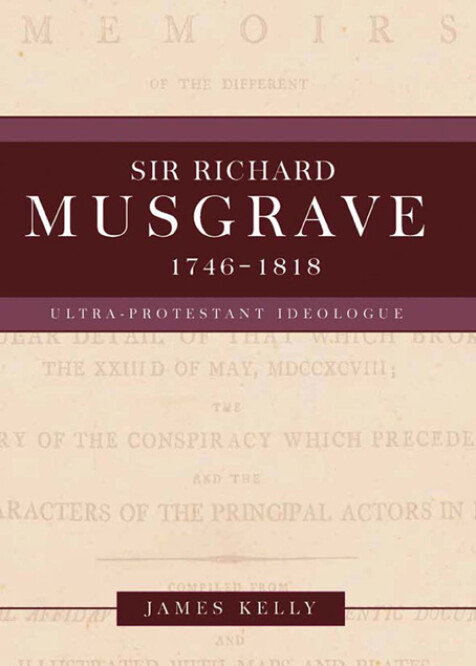Sir Richard Musgrave, 1746–1818
Ultra-protestant ideologue
James Kelly
'Kelly's study attempts to understand Musgrave and his motivation. He examines his life and the historical context of eighteenth-century Ireland to explain why he was so staunchly Protestant and anti-Catholic in his outlook. He considers also the lasting influence of Musgrave's writings in a book that sheds new light on someone usually viewed in two-dimensional terms', Books Ireland (April 2009).
'There is much to commend in Kelly’s book, which is perhaps more of a biographical study than a straightforward biography, as Musgrave becomes a means of casting light on the ferocious sectarianism of (some) Irish Protestants at a key juncture in their history … this study makes a powerful contribution to Irish intellectual history', John Gibney, History Ireland (May/June 2009).
‘Until James Kelly’s new biography, Sir Richard Musgrave, the most influential loyalist writer of his generation, has not been accorded the full scholarly attention that his contemporary importance merits. Kelly’s scrupulously-researched study begins by tracing Musgrave’s early background … [his] analysis of Musgrave’s research and compositional methods for his magnum opus is both judicious and convincing and leads to balanced conclusions which recognise both Musgrave’s bias towards supportive testimony and considerations like the detrimental impact of hasty composition on the first various of the Memoirs … Kelly’s assiduous examination of the key contexts of dissemination, reception and debate, advances our understanding of just how crucial a text this was for ultra-Protestants seeking to represent their views in the public sphere … this fine study is essential reading for anyone interested not just in the history of loyalism but in this crucial transitional period as a whole', Allan Blackstock, Eighteenth-Century Ireland (2009).
‘Kelly’s account of the production, distribution and reception of Musgrave’s Memoirs both in Ireland and, less familiarly, in Britain, is brilliantly done and it is difficult to see how it could be surpassed. His research is painstaking and his analysis of the book’s contents and its audience is extremely thorough … one of the most important aspects of this important book is the attention paid to Musgrave’s post-Memoirs writing … Kelly has performed a major service in identifying the networks of Ultra Protestant writers and ideologues whose ideas moved freely between Ireland and Britain in the early decades of the nineteenth century … this is a fine book by a historian who is steeped in the literature, printed and in manuscript of the period, and who is writing at the top of his form', Thomas Bartlett, Irish Literary Supplement (Autumn 2010).
‘Kelly’s characteristically thorough and incisive study is comprehensive. It exposes many extant misunderstandings, not least in the Oxford Dictionary of National Biography entry, which has Musgrave’s date of birth wrong, miscalculates his income as excise collector for Dublin port, and more significantly claims in error that “Musgrave wrote very little after the Memoirs, publishing only one pamphlet critical of Catholic affairs in 1814”', Guy Beiner, American Historical Review (October 2010).

